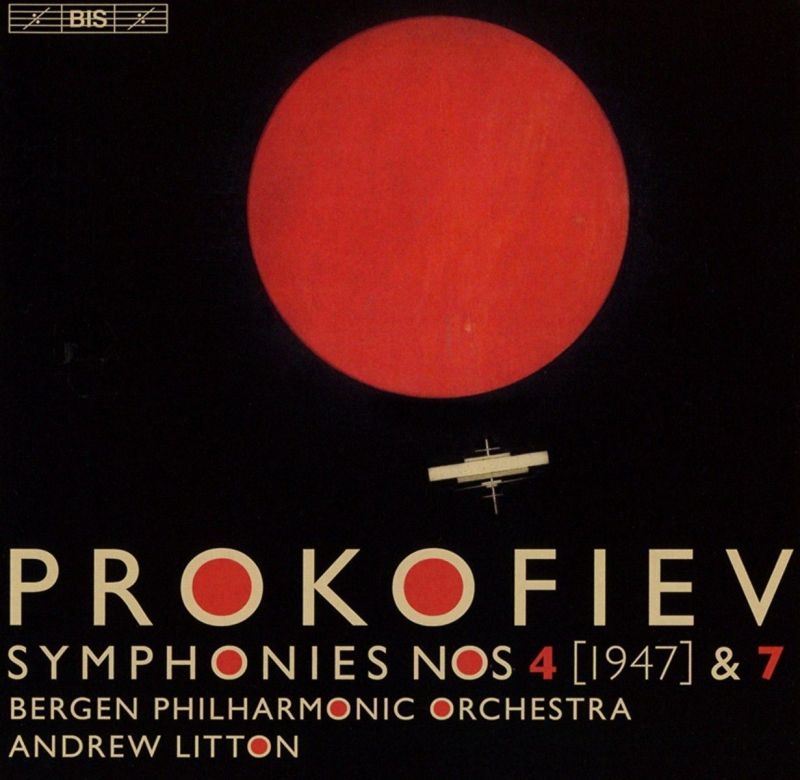PROKOFIEV Symphonies Nos 4 & 7
View record and artist detailsRecord and Artist Details
Composer or Director: Sergey Prokofiev
Genre:
Orchestral
Label: BIS
Magazine Review Date: 11/2016
Media Format: Super Audio CD
Media Runtime: 81
Mastering:
DDD
Catalogue Number: BIS2134

Tracks:
| Composition | Artist Credit |
|---|---|
| Symphony No. 4 |
Sergey Prokofiev, Composer
Andrew Litton, Conductor Bergen Philharmonic Orchestra Sergey Prokofiev, Composer |
| Symphony No. 7 |
Sergey Prokofiev, Composer
Andrew Litton, Conductor Bergen Philharmonic Orchestra Sergey Prokofiev, Composer |
| Symphony No. 7, Movement: Vivace (alt. ending) |
Sergey Prokofiev, Composer
Andrew Litton, Conductor Bergen Philharmonic Orchestra Sergey Prokofiev, Composer |
Author: David Gutman
Gone are the days when Western commentators would condemn the Fourth’s Soviet-era recasting as an ideologically motivated distortion of Prokofiev’s leaner original. Paradoxically it was Adrian Boult who directed what seems to have been the world premiere of the 1947 edition in a BBC broadcast. By 1950 the composer was getting few performances at home as a consequence of the renewed cultural clampdown of Stalin’s last years. Like Marin Alsop, Litton has conducted this later, grander version extensively in concert, not least a fine rendition at the BBC Proms in 2011. Both Americans shape its discourse with an assurance not readily obtained in rehearse-record sessions. Alsop’s softer, string-dominated sonorities work surprisingly well. However, it is Litton, helped by superior sound engineering, who allows detail to register more cleanly. More important, he makes the piece sound purposefully ‘symphonic’ and, in music twice refashioned by the composer over a 20 year period, that counts for a good deal. Any minor agogic hesitations are perfectly calibrated to make the argument seem much more than a would-be heroic gloss on Parisian source material.
Kirill Karabits is probably Litton’s most potent rival in the Seventh, given that Gergiev’s massively long-breathed conception takes the music into territory you may or may not wish to explore. While all three interpretations are very fine (Alsop’s recording has yet to emerge), the BIS team obtain a more consistently natural, brighter balance from Bergen’s Grieg Hall. We are also invited to explore alternative finales: a ninth track offers the Vivace with the happy ending Prokofiev appended in the hope of wowing the commissars. Long heard with final flourish intact, the symphony is now more usually played as originally conceived, reflecting the composer’s wishes as conveyed to Mstislav Rostropovich. Yes, track 8’s downbeat conclusion is far more affecting, but it is thought-provoking to have a concrete manifestation of the impact of totalitarianism on a supposedly abstract art form.
Discover the world's largest classical music catalogue with Presto Music.

Gramophone Digital Club
- Digital Edition
- Digital Archive
- Reviews Database
- Full website access
From £8.75 / month
Subscribe
Gramophone Full Club
- Print Edition
- Digital Edition
- Digital Archive
- Reviews Database
- Full website access
From £11.00 / month
Subscribe
If you are a library, university or other organisation that would be interested in an institutional subscription to Gramophone please click here for further information.




